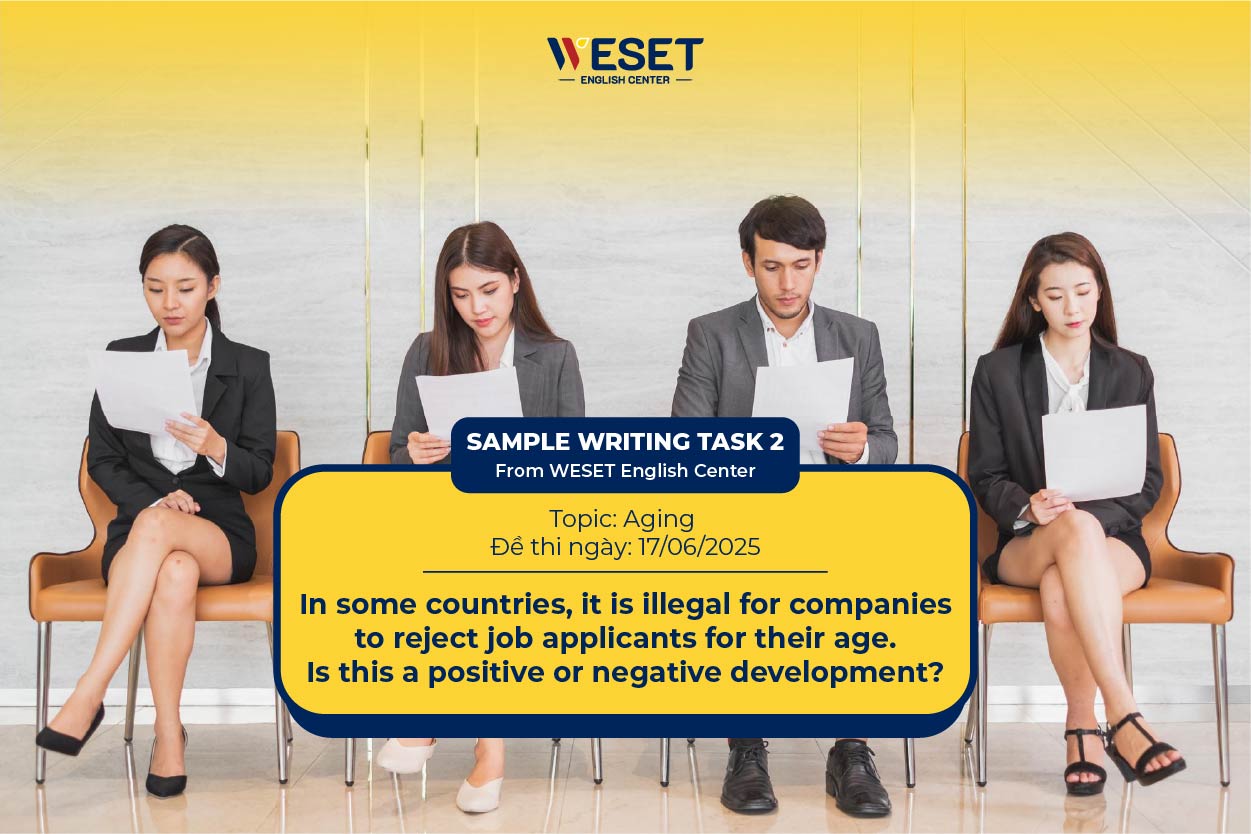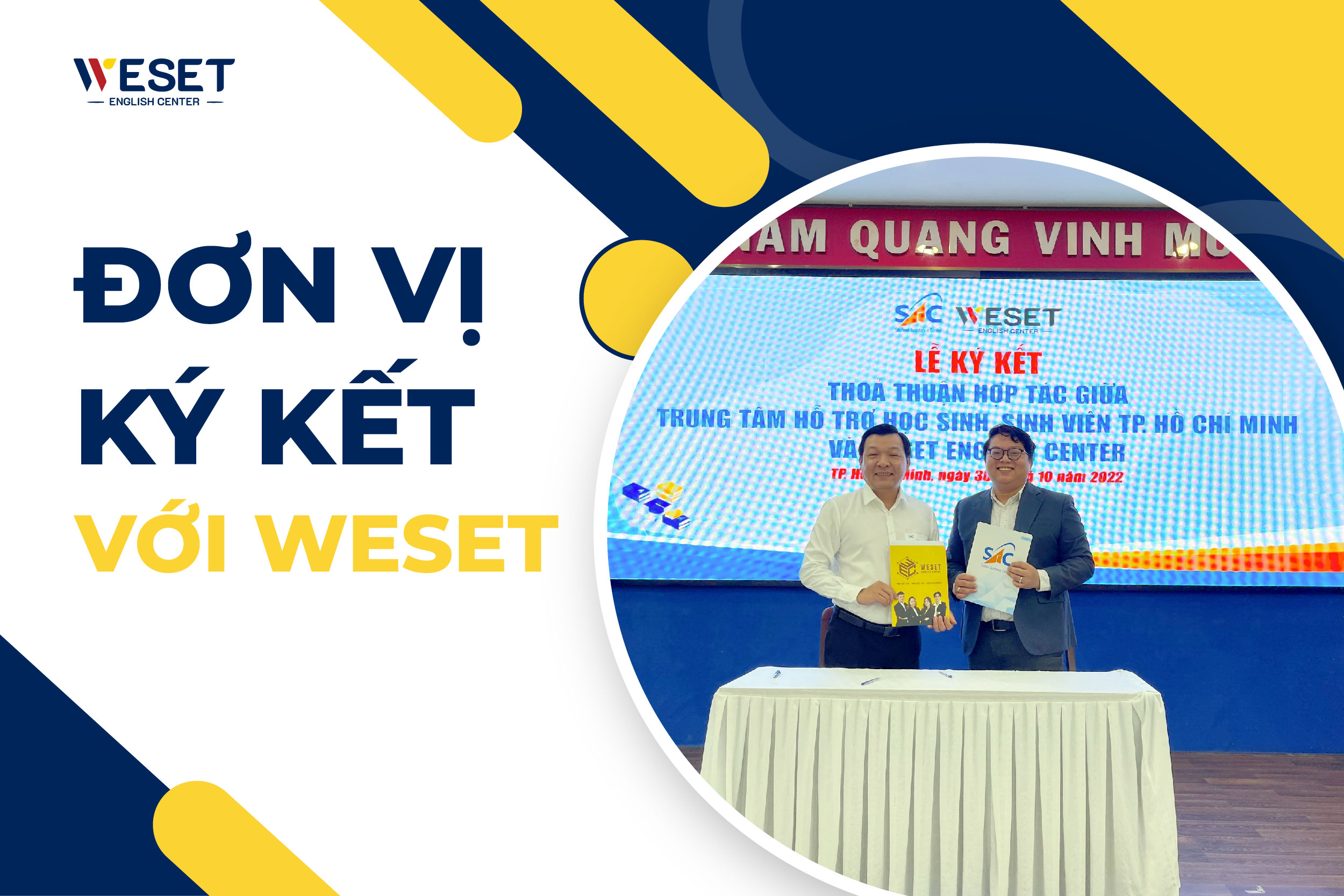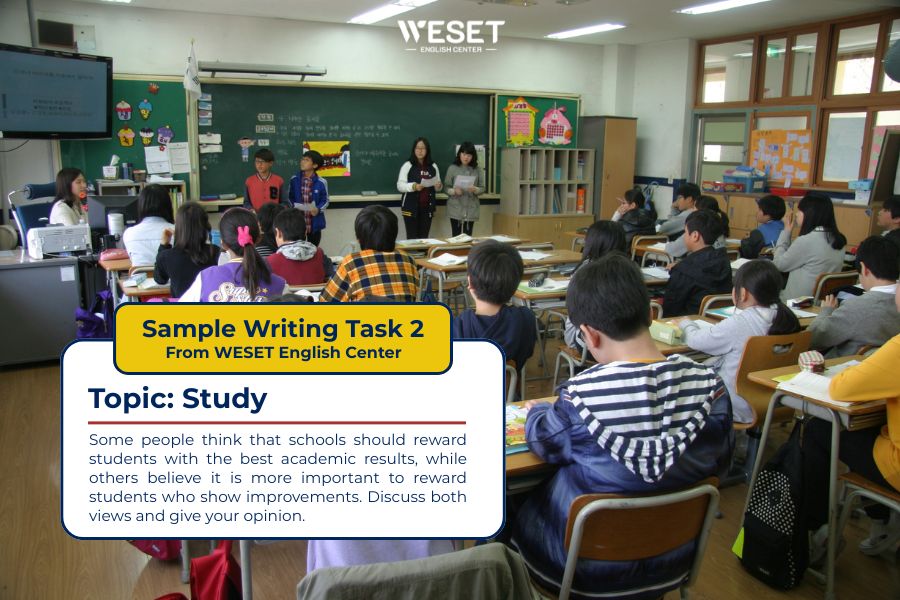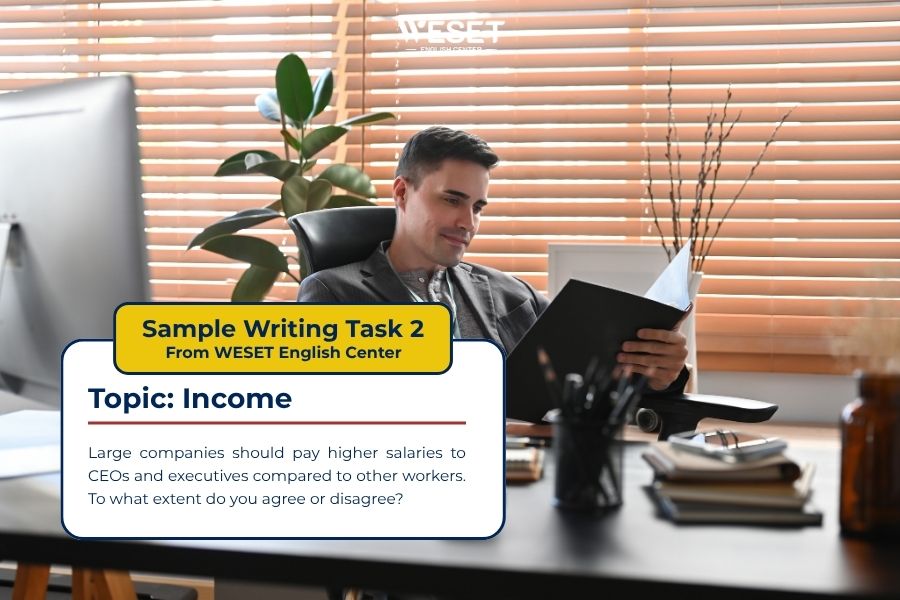BÀI MẪU WRITING TASK 2 | CHỦ ĐỀ: AGING
- Admin
- Bài mẫu IELTS Sample Writing, Bài mẫu Task 2 IELTS Writing sample, Bài thi IELTS mẫu, Blog
MỤC LỤC
In some countries, it is illegal for companies to reject job applicants for their age. Is this a positive or negative development? Give reasons for your answer and include any relevant examples from your own knowledge or experience.

IELTS Writing task 2 | Chủ đề: Aging
1. Dàn bài
-
Introduction:
Paraphrase lại đề bài và thể hiện quan điểm cá nhân
-
Body
-
Đoạn 1: Các điểm tiêu cực:
-
-
-
-
Việc cấm phân biệt tuổi tác có thể dẫn đến việc tuyển dụng những ứng viên không đáp ứng đủ yêu cầu cho một số vị trí. Cụ thể, các ứng viên lớn tuổi có thể gặp khó khăn trong những lĩnh vực đòi hỏi sự nhanh nhẹn và thích ứng nhanh
-
-
→ Ảnh hưởng trực tiếp đến hiệu suất làm việc.
-
-
-
Những nhân sự lớn tuổi có thể chật vật với việc cập nhật công nghệ mới: Đây là một thực tế khoa học, vì khi đến một độ tuổi nhất định, khả năng thích ứng với thay đổi của con người thường kém đi.
-
-
→ Khó khăn trong việc thực hiện công việc.
-
- Đoạn 2: Các điểm tích cực:
Luật này giúp hiện thực hóa các giá trị mà các doanh nghiệp hiện đại tìm kiếm là tính bao gồm và tính đổi mới:
-
-
-
Luật thúc đẩy sự công bằng trong quá trình tuyển dụng: Luật này cho phép đánh giá ứng viên dựa trên trình độ và kinh nghiệm thay vì tuổi tác, đảm bảo sự công bằng trong tuyển dụng. Hơn thế nữa, các ứng viên lớn tuổi
-
-
→ Ví dụ, một công ty marketing có thể tạo ra một chiến dịch kết hợp giữa các giá trị truyền thống được tư vấn bởi những người lớn tuổi và những phương pháp hiện đại mà thế hệ trẻ nắm vững.
-
Kết bài:
Khẳng định lại quan điểm trong bài thi của mình
2. Bài mẫu
A legal practice that has gained considerable popularity in several nations is not to consider job seekers’ age during recruitment. Although this change is mostly favourable, there are still less advantageous aspects to take into consideration.
On the one hand, the ban on age discrimination may lead to under-qualification for particular positions. Older applicants may struggle in fields that require agility and rapid adaptation, which could have a direct impact on performance. Not to mention, seasoned workers might find it hard to stay in the loop with new technologies. Though unfortunate, this proves to be a scientific fact, as our minds are wired to react more poorly to change as we reach certain ages. This makes working all the more challenging for labourers.
Yet, on the other hand, the law helps realize the values of inclusiveness and innovation, which are sought by most modern enterprises. Firstly, the law promotes fairness and efficiency in recruitment. By allowing candidates to be evaluated based on their qualifications and experience rather than their age, equity is ensured in the hiring process. Furthermore, older candidates possess invaluable expertise from years of experience, which can contribute to both mentoring the younger workforce and boosting performance. And secondly, this development paves the way for out-of-the-box solutions. Different generations have different viewpoints, and if guided correctly, the clash between their worlds can be the formula for endless creativity. This collaboration enables companies to hit the ground running with fresh ideas and insightful views. For example, by bringing together a mixed-age team, a marketing company can bring to life a campaign that seamlessly incorporates the nuances of traditional values advised by older workers with the trendy approaches that the younger generation knows best.
At the end of the day, despite the drawbacks, the legalization of prohibiting age-based judgment in the hiring process brings more to the business table than it does not. Therefore, it is essential to continue advocating for fairness, while aiding older employees in what they still lack.
( 330 words)
3. Vocabulary
- Legal (adj): Hợp pháp, theo luật pháp.
- Considerable (adj): Đáng kể, lớn lao.
- Discrimination (n): Sự phân biệt, kỳ thị.
- Favourable (adj): Thuận lợi, có lợi.
- Under-qualification (n): Thiếu trình độ, không đủ tiêu chuẩn.
- Agility (n): Sự nhanh nhẹn, linh hoạt.
- Adaptation (n): Sự thích nghi, điều chỉnh.
- Impact (n): Tác động, ảnh hưởng.
- Seasoned (adj): Dày dạn kinh nghiệm, lão luyện.
- Stay in the loop (idiom): Cập nhật thông tin, giữ liên lạc.
- Challenging (adj): Thách thức, khó khăn.
- Scientific (adj): Khoa học, thuộc về khoa học.
- Inclusivity (n): Tính bao hàm, sự bao gồm.
- Promotes (v): Thúc đẩy, khuyến khích.
- Fairness (n): Sự công bằng.
- Equity (n): Sự công bằng, công lý.
- Invaluable (adj): Vô giá, không thể định giá.
- Expertise (n): Chuyên môn, kiến thức chuyên sâu.
- Mentoring (v): Hướng dẫn, chỉ dẫn.
- Out-of-the-box (idiom): Sáng tạo, không theo lối mòn.
- Viewpoints (n): Quan điểm, cách nhìn nhận.
- Clash (n): Sự xung đột, va chạm.
- Collaboration (n): Sự hợp tác, làm việc chung.
- Hit the ground running (idiom): Bắt tay vào việc ngay lập tức, làm việc hiệu quả từ đầu.
- Nuances (n): Sắc thái, chi tiết nhỏ.
- Bring sth to the table (idiom): Mang đến lợi ích, giá trị
- Advocating (v): Vận động, ủng hộ.
- Aid (v): Giúp đỡ, hỗ trợ.





